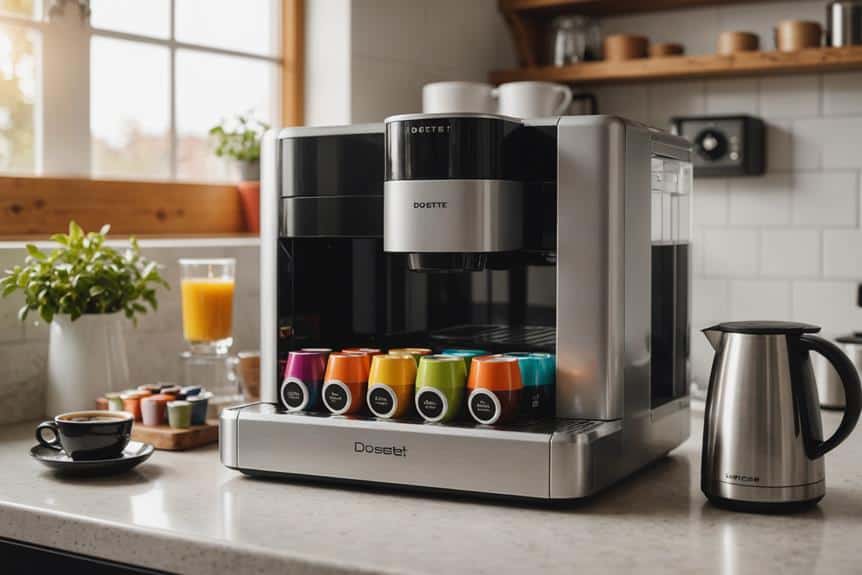A dosette box is a handy tool that organizes up to a week's worth of medication into 28 compartments. It helps you manage your prescriptions and reduces the chance of missed or wrong doses. To use one, label the compartments by day and time, set reminders, and refill the box every week to guarantee accuracy. You might consider factors like compartment labels and ease of use when choosing a dosette box. Caregivers can also help by filling it weekly and monitoring medication intake. Understanding these features can enhance your experience and support your medication adherence.
Definition of a Dosette Box
Most dosette boxes can hold a week's worth of medication, featuring 28 compartments to accommodate your daily doses. This design not only simplifies your medication routine but also enhances medication adherence. By organizing your medications in advance, you reduce the chance of missing a dose or taking the wrong medication.
Some models go a step further by including built-in alarms or reminders. These features can be particularly helpful for individuals who may struggle with remembering their schedules. When choosing a dosette box, it is crucial to reflect on your specific medication needs. Think about the complexity of your regimen and your ability to manage the box effectively.
Whether you're managing chronic conditions or simply want to guarantee you're taking your vitamins consistently, a dosette box can be an invaluable tool. It allows you to take control of your health and helps confirm you stick to your prescribed medication plan. With this tool by your side, you can feel more confident in your ability to maintain your health and well-being.
Benefits of Using a Dosette Box
One of the key benefits of using a dosette box is the visual tracking it offers. This feature makes it easier to remember whether you've taken your medications, which is especially helpful for those with cognitive impairments. You can simply glance at the box to see if you've completed your doses, promoting medication adherence. Furthermore, dosette boxes serve as a part of a broader medication compliance aid strategy, which can further enhance the effectiveness of managing multiple medications.
Additionally, dosette boxes centralize your medication storage, making it easier for caregivers to monitor your usage. This support is invaluable in ensuring that doses are taken as prescribed, leading to better health outcomes in the long run.
Another advantage is cost-effectiveness. By encouraging independence in your medication management, a dosette box can save money on potential hospital visits due to missed doses or medication errors. With all these benefits combined, using a dosette box not only simplifies your routine but also empowers you to take control of your health. Ultimately, it's a practical step toward effective chronic condition management.
How to Use a Dosette Box
If your dosette box doesn't have pre-printed labels, take a moment to label each compartment with the corresponding day and time. This simple step adds clarity and helps prevent any confusion during the week. After filling the box, set alarms or reminders on your phone or another device to prompt you when it's time to take your medications. These adherence strategies can greatly improve your chances of following your medication schedule.
Regularly check and refill your dosette box, ideally at the same time each week. This routine helps maintain an accurate medication schedule, preventing missed doses and keeping your health on track. If your medication regimen changes or if you have any questions about using the dosette box, don't hesitate to consult your pharmacist. They can provide valuable insights and guarantee you're using the box correctly.
Choosing the Right Dosette Box
Look for dosette features that facilitate medication organization. Clear labeling of compartments for each day and time simplifies access to your medications, making it easier to stick to your schedule. Easy-to-open compartments are vital, especially if you have mobility or dexterity challenges. You don't want to struggle with your dosette box when it's time for your medication.
Durability also plays an important role in your choice. If you need to transport your dosette box, opt for sturdy, waterproof, or spill-proof designs to protect your medications. This guarantees they remain safe and effective, no matter where you go.
Role of Caregivers in Medication Management
Choosing the right dosette box is just the first step in effective medication management. As a caregiver, your responsibilities extend beyond simply filling the dosette. You play an important role in ensuring that medications are taken correctly and on time, which is essential for the well-being of the individual you care for. Adherence to personalized care plans is critical, and filling the dosette box weekly helps prevent missed or incorrect dosages, which can lead to serious health issues.
Medication education is another key aspect of your role. You need to help the individual understand their medication regimen, explaining the purpose and timing of each drug. This is especially important for those with memory challenges, as clear instructions can greatly improve adherence. By monitoring medication intake, you can also observe any side effects or adverse reactions. If something seems off, it's important to report these observations to healthcare providers so they can make necessary adjustments.
Additionally, organizing medications and setting reminders can greatly enhance adherence to prescribed routines. This proactive approach reduces the risk of hospitalizations related to medication errors, ensuring that the person you care for stays healthy and safe. Regular communication with healthcare professionals is crucial, too. It helps keep everyone informed about any changes in medication needs, ensuring timely adjustments.





